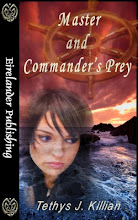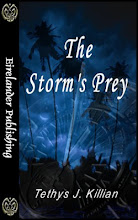So far this month we've touched on real life, make believe and everything in between in our writing and out of it. From shoes and how each person interprets characters in their varied ways to the real tragedy of death in life.
So how much reality do you (or us) as a reader need? Want? What will you believe? What sucks you into the story? Is it the fantastical of Science Fiction or the historical of the Victorian era? Something in between?
This is going to be a post about my writing and how much reality I need to make my stories work. Why? Well because I can't write about T.J.'s (and I'm sure she's very appreciative of that fact). I use real places often as the model for my make believe, or landmarks that are well known to give placement. Locations are really one of the easiest things to mirror and create a fictional place or town from. How many times have you read about X and thought to yourself, "That sounds just like ___!" It might have been. But there's a comfort in that connection, a sense of knowledge that allows you to really become a part of that story and be absorbed by it. Most often, I just use a vacinity. i.e. Bend, Oregon for my Aiza Clan Shifter books, Fisherman's Wharf in The Eternal Kiss, but nothing more specific to the real world. Everything I create from that broad point is fictional to the final dot.
For reading, there has to be enough reality to make me believe that everything else that happens in the story is plausible. Okay, so we know vampires really don't exist, but in the world between those two covers, they do, and that world has to exist correctly balanced for them to be there. The hard part is making that reality as close to real life reality as possible so any reader feels the connection. So any reader can believe the unbelievable.
If you think about it, almost every fictional tale out there has some nugget of reality in it. Star Trek even for being in the future shows technology along things we recognize (the old series and the new movie included). Harry Potter-the same. They might walk through walls in the train station, but they're still in the train station. Those factors of recognition give us, the reader, our baseline for reality.
So the next time you're reading a book, think about the amount of reality in that story. Does it draw you in deeper? Make you think of places you've visited or lived? Make you wonder about the commonality of the things in our lives that we don't even think about anymore (cars, computers, furniture)?
Honestly, if you read the entire book, and never once catch the reality in it, then the author did a good job of writing it to fit that book to give it a life of its own. And that's the kind of reality in reading and writing I love.





.jpg)
.jpg)






1 comment:
Diana,
What a really good post, a totally different aspect on reality.
Thanks. You gave me something else to think about.
Post a Comment